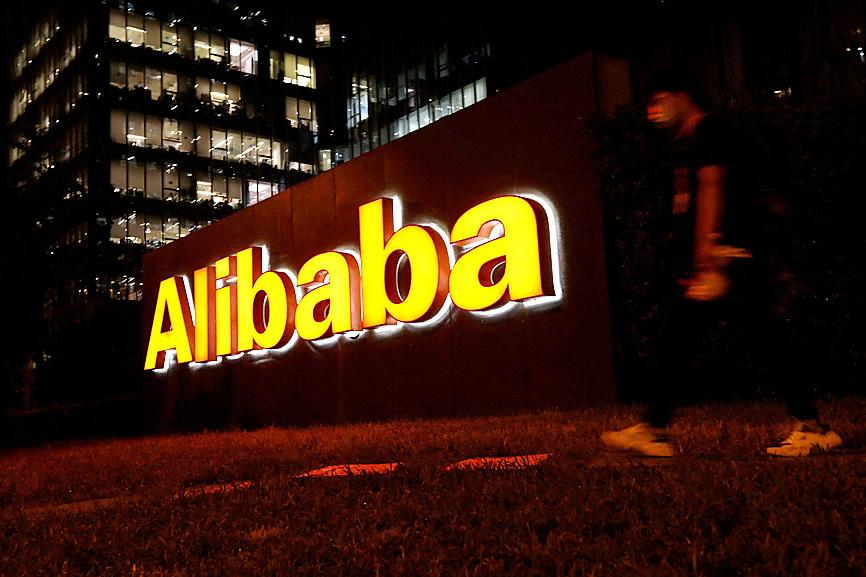E-commerce giant Alibaba Group Holding Ltd (阿里巴巴) yesterday said it would seek a primary listing in Hong Kong, potentially giving access to China’s vast pool of investors, as Chinese officials indicate a long-running crackdown on the tech sector could be coming to an end.
The move also comes as Chinese tech companies traded in New York grow increasingly worried about a regulatory drive by US authorities amid simmering tensions between the superpowers.
While Alibaba has a secondary listing in Hong Kong, that does not allow it to join a popular Stock Connect program that links to bourses in Shanghai and Shenzhen.

Photo: Reuters
The primary listing, which is expected to take place before the end of the year, would open that door.
News of the plan sent shares in Alibaba soaring more than 5 percent yesterday, boosting other tech firms and helping drag the broader Hang Seng Index higher.
Alibaba chief executive officer and group chairman Daniel Zhang (張勇) said the primary listing aimed to foster “a wider and more diversified investor base to share in Alibaba’s growth and future, especially from China and other markets in Asia.”
“Hong Kong is also the launch pad for Alibaba’s globalization strategy, and we are fully confident in China’s economy and future,” Zhang said.
Alibaba said it had an average daily trading volume of US$3.2 billion in the US in the first six months of the year, while its Hong Kong secondary listing saw about US$700 million.
Hong Kong’s Stock Connect program enables firms to take advantage of liquidity from China for easier financing and higher valuations, but to qualify they must conduct a majority of their annual trading in the Chinese finance hub.
Alibaba is among a category of “innovative” Chinese firms with weighted voting rights or variable interest entities that would be eligible for dual-primary listing in Hong Kong, following a rule change by the bourse in January.
The move would be “massive” for Alibaba, said Forsyth Barr Asia Ltd analyst Willer Chen (陳偉樂), adding that inclusion in Stock Connect could lead to a “more diversified investor base.”
Beijing has opposed an attempt by US regulators to inspect the audit papers of Chinese firms listed there, and Alibaba is among 250 companies that face potential removal if no deal is reached.
Domestically, Alibaba is still reeling from the tech crackdown as well as China’s slowing economy caused by the fallout from strict COVID-19 curbs.
The firm has lost about two-thirds of its value since a 2020 peak, Bloomberg said, and in May the firm reported that profit fell 59 percent in the past fiscal year.

Taiwan Semiconductor Manufacturing Co (TSMC, 台積電) has secured three construction permits for its plan to build a state-of-the-art A14 wafer fab in Taichung, and is likely to start construction soon, the Central Taiwan Science Park Bureau said yesterday. Speaking with CNA, Wang Chun-chieh (王俊傑), deputy director general of the science park bureau, said the world’s largest contract chipmaker has received three construction permits — one to build a fab to roll out sophisticated chips, another to build a central utility plant to provide water and electricity for the facility and the other to build three office buildings. With the three permits, TSMC

The DBS Foundation yesterday announced the launch of two flagship programs, “Silver Motion” and “Happier Caregiver, Healthier Seniors,” in partnership with CCILU Ltd, Hondao Senior Citizens’ Welfare Foundation and the Garden of Hope Foundation to help Taiwan face the challenges of a rapidly aging population. The foundation said it would invest S$4.91 million (US$3.8 million) over three years to foster inclusion and resilience in an aging society. “Aging may bring challenges, but it also brings opportunities. With many Asian markets rapidly becoming super-aged, the DBS Foundation is working with a regional ecosystem of like-minded partners across the private, public and people sectors

BREAKTHROUGH TECH: Powertech expects its fan-out PLP system to become mainstream, saying it can offer three-times greater production throughput Chip packaging service provider Powertech Technology Inc (力成科技) plans to more than double its capital expenditures next year to more than NT$40 billion (US$1.31 billion) as demand for its new panel-level packaging (PLP) technology, primarily used in chips for artificial intelligence (AI) applications, has greatly exceeded what it can supply. A significant portion of the budget, about US$1 billion, would be earmarked for fan-out PLP technology, Powertech told investors yesterday. Its heavy investment in fan-out PLP technology over the past 10 years is expected to bear fruit in 2027 after the technology enters volume production, it said, adding that the tech would

RUN IT BACK: A succesful first project working with hyperscalers to design chips encouraged MediaTek to start a second project, aiming to hit stride in 2028 MediaTek Inc (聯發科), the world’s biggest smartphone chip supplier, yesterday said it is engaging a second hyperscaler to help design artificial intelligence (AI) accelerators used in data centers following a similar project expected to generate revenue streams soon. The first AI accelerator project is to bring in US$1 billion revenue next year and several billion US dollars more in 2027, MediaTek chief executive officer Rick Tsai (蔡力行) told a virtual investor conference yesterday. The second AI accelerator project is expected to contribute to revenue beginning in 2028, Tsai said. MediaTek yesterday raised its revenue forecast for the global AI accelerator used